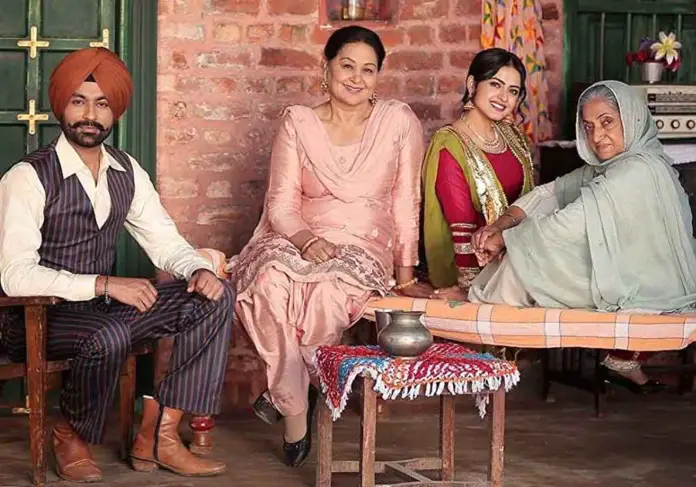Sunita Dher belongs to the Indian Punjabi film industry. She has worked in a number of super-hit films including ‘Jutt and Juliet’, ‘Sardar Jee’ and ‘Jugg Jeyundia’n De Mele’, her first film, however, being ‘Chann Pardesi’. Sunita Dher started her acting career with the theatre play ‘Mirza Sahiba’n’ in 1975 but always preferred her education over her acting, thereby resulting in completing an M.Phil. and a PhD for herself despite being an age and class-fellow of popular Bollywood actor Anupam Kher. She also remained the head of University of Chandigarh’s Theatre Department for long, and recently happened to attend the Punjabi International Conference held in Lahore. Sunita Dhir was asked a few questions post the conference, which are as follows along with their answers.
How do you feel about being a part of Punjabi International Conference?
This is my twelfth experience of participating in the Punjabi International Conference. Whenever I come to Lahore, it feels new yet beautiful at the same time. I have also walked through the narrow alleys of old Lahore’s Delhi Gate. At the same time, I have also observed the new and modern Lahore which has expanded near and about the canal. It’s lovely!
To what extent do you think this conference will help bridge relations between Pakistan and India?
I believe it is a very successful endeavour. Intellectuals from India come over here to have detailed conversations with the intellectuals from this part of the world. Lahore’s literary scene is quite strong, and so is that of Punjabi in our case. The amalgamation of the two brings about very fruitful discussions.
Do you think relations between the two countries can take a good turn with the establishment of the new government in Indian Punjab?
One can hope for good terms between the two countries with the arrival of Bhagwant Singh. He is not only a good actor but a wonderful human being as well with an inspirational body-language. He does what he says he will do. During my days as the Director – Youth Welfare, he would come to the university along with his theatre team. He knew well the art of moulding his script in accordance with his students’ reactions. He also acted as the director of my film ‘Police in Pollywood Balle Balle’.
These days, Punjabi cinema is at its peak. Who do you give credit to for this?
It was initially our music which gained world-wide recognition, and then our films. It was actually our singers who produced films and since they had a market and identity of their own, they developed a fan-following. It’s a matter of pleasure for us that our films are now being screened across Canada, Australia, London and even Pakistan. Their global appeal is a matter of immense pride and happiness.
You have played the role of Harbhajan Singh’s mother as well. How does it feel performing the parent of an actor who is of the same age as you?
It feels good, as you get to explore yourself as an actor while playing the parent of your contemporary. Besides, when it comes to Punjabi films, the role of a mother is highly significant. It is the second most important role after the heroine in Punjabi film narratives, so it’s both a pleasure and an honour.
You rejected Bollywood in order to pursue your education. It must have negatively affected your acting career. Is that so?
I did go to Mumbai, back in the times when people had to make several visits to offices related to film-work, something I have never appreciated when it comes to work. I have never begged for work, but have only accepted the offers I have received. Besides, I was doing my masters at that time and my father suggested me to complete my education first.
I was offered a film by Shashi Kapoor after the success of my cinematic project ‘Chann Pardesi’ but in those days as well, I had my exams going so I rejected the offer. There is a probability that had I left my education back then, I would have become a heroine for 12 to 13 years, but now, I have been acting for over 40 years and that too in various roles.
You did a PhD on 20th century’s acting style. Does this topic have to do with your association with theatre?
Initially, all the theatre dramas I did were adaptations of Western classics, which we would turn into Punjabi. It was while we were doing those that I developed an interest in world literature, after which I did an M.Phil. on the comparison between Epic Theatre and Method Acting and then a PhD in acting style. Other than that, I did a one-year course from Hawaii as well.
Do you follow Pakistani films or dramas?
I have watched only a few films of Anjuman and Sultan Rahi, but dramas, yes! I have watched classic Pakistani dramas like ‘Tanhaiyaan’ and really admire them. Even amongst contemporary Pakistani dramas, I have watched all the hit ones including ‘Zindagi Gulzar Hai’, ‘Mere Pass Tum Ho’ and ‘Hum Kahan Ke Sache The’.
Don’t you think Pakistani dramas have lately started taking inspiration from Indian dramatic works?
Yes. Initially, they were very good and lately, they have confined themselves to ‘saas-bahu’ topics. It is quite probable that this might have been the influence of Indian dramas, but on the whole, Pakistani dramas are much better and worth-watching.
Which Pakistani actors do you hold a liking for?
I really like Ayeza Khan, Mahira Khan and Sarah Khan.
Does Bollywood influence Punjabi Indian films?
Yes, but only to some extent. The culture of Indian Punjab is so strong in itself that it doesn’t feel the need to take inspiration. In fact, it’s the Punjabi culture which is at times copied by Bollywood.
How is it possible for the youth of Indian Punjab to get rid of its problems, specifically their recent disappointing inclination towards drugs?
The situation is not so worse so as to result in a complete collapse. If the government pays attention, things can be brought under control.
How can we build a better relationship between Pakistan and India?
Our focus should not only be on the veneration and promotion of our culture, but facilities should also be provided to people so that relationships can be strengthened between them regardless of borders. There are no differences as such between Lahore and Amritsar, and hence their borders should be opened for each other. It would be lovely to leave Amritsar in the morning and then return at night after having dinner from Lahore, no? A reasonable entry fee can be allotted if not a completely free exchange between the two cities is possible. This will benefit both the governments as well, along with their respective tourism departments.







